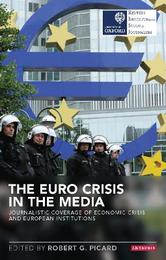
|
The Euro Crisis in the Media: Journalistic Coverage of Economic Crisis and European Institutions
Paperback / softback
Main Details
| Title |
The Euro Crisis in the Media: Journalistic Coverage of Economic Crisis and European Institutions
|
| Authors and Contributors |
Edited by Robert G. Picard
|
| Series | Reuters Institute for the Study of Journalism |
|---|
| Physical Properties |
| Format:Paperback / softback | | Pages:320 | | Dimensions(mm): Height 216,Width 138 |
|
| ISBN/Barcode |
9781784530600
|
| Classifications | Dewey:330.9409051 330.9409051 |
|---|
| Audience | | Postgraduate, Research & Scholarly | |
|---|
|
Publishing Details |
| Publisher |
Bloomsbury Publishing PLC
|
| Imprint |
I.B. Tauris
|
| Publication Date |
28 July 2015 |
| Publication Country |
United Kingdom
|
Description
The Euro Crisis produced the most significant challenge to European integration in 60 years testing the structures and powers of the European Union and the Eurozone and threatening the common currency. This book explores how the financial and political crisis was portrayed in the European press and the implications of that coverage on public understanding of the developments, their causes, responsibilities for addressing the crisis, the roles and effectiveness of European institutions, and the implications for European integration and identity. It addresses factors that shaped news and analysis, the roles of European leaders, and the extent to which national and pan-European debates over the crisis occurred. In doing so, it provides a clear and readable explanation of what the portrayals tell us about Europe and European integration in the early twenty-first century."
Author Biography
Robert G. Picard is Director of Research at the Reuters Institute in the Department of Politics and International Relations at University of Oxford, a research fellow at Green Templeton College, Oxford, and a fellow of the Royal Society of Arts. He is a specialist in media economics and policy, author and editor of 28 books, and has consulted for numerous governments and international organisations including the European Commission, UNESCO and the World Intellectual Property Organisation.
|